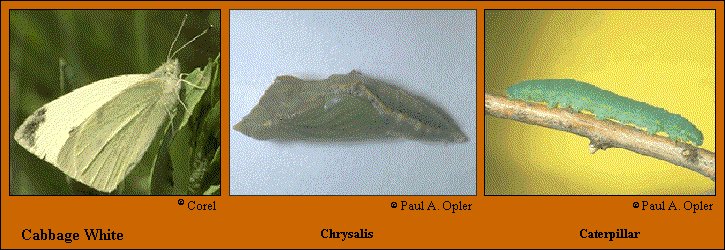 |
 

 |



Cabbage White (Pieris rapae [Linnaeus])
Wing span: 1 3/4 - 2 1/4 inches (4.5 - 5.8 cm).
Identification: Upperside of wings white; forewing with black tip. Two submarginal black spots in female, one in male. Underside of hindwing and forewing apex evenly yellow-green or gray-green. Spring and fall short-day form is smaller, less yellow, with reduced black areas.
Life history: Males patrol for females. Females lay single eggs on undersides of host leaves. Chrysalids hibernate.
Flight: Two to three in northern part of range; 7-8 in the south. It is usually the first butterfly to emerge in spring.
Caterpillar hosts: Many plants in the mustard (Brassicaceae) family and occasionally some in the caper family (Capparidaceae).
Adult food: Flower nectar from a very wide array of plants including mustards, dandelion, red clover, asters, and mints.
Habitat: Almost any type of open space including weedy areas, gardens, roadsides, cities, and suburbs.
Range: From central Canada south through the United States (except Florida Keys, southern Louisiana, and South Texas) to northwest Mexico.
Conservation: Not required.
Management needs: Ensure control steps do not affect other invertebrate fauna.
The Nature Conservancy Global Rank: G5 - Demonstrably secure globally, though it may be quite rare in parts of its range, especially at the periphery.
References:
Opler, P. A. and G. O. Krizek. 1984. Butterflies east of the Great Plains.
Johns Hopkins University Press, Baltimore. 294 pages, 54 color plates.
Opler, P. A. and V. Malikul. 1992. A field guide to eastern butterflies.
Peterson field guide #4. Houghton-Mifflin Co., Boston. 396 pages,
48 color plates.
Tilden, J. W. 1986. A field guide to western butterflies. Houghton-Mifflin
Co., Boston, Mass. 370 pages, 23 color plates.
Author: Jane M. Struttmann
State and Regional References:
Layberry, R.A., Hall, P.W. & Lafontaine, D.J., 1998. The Butterflies of
Canada. University of Toronto Press, Toronto, ON. 280 pp.